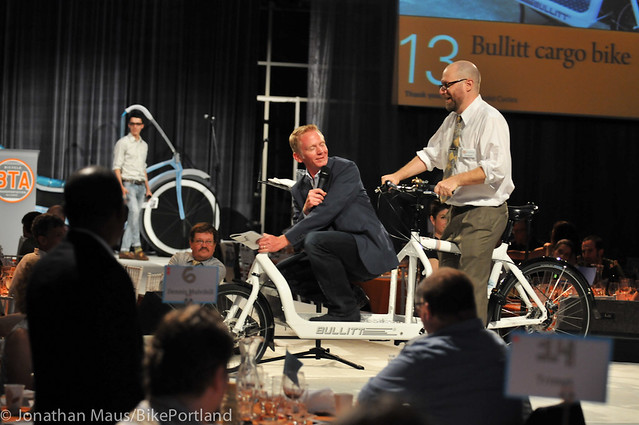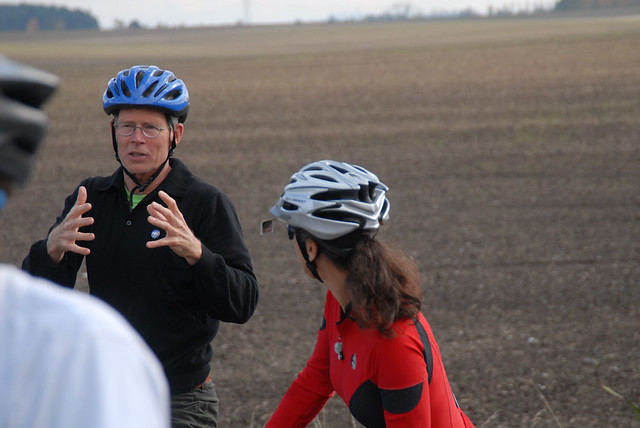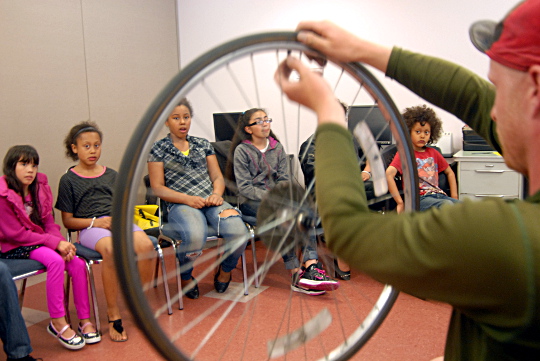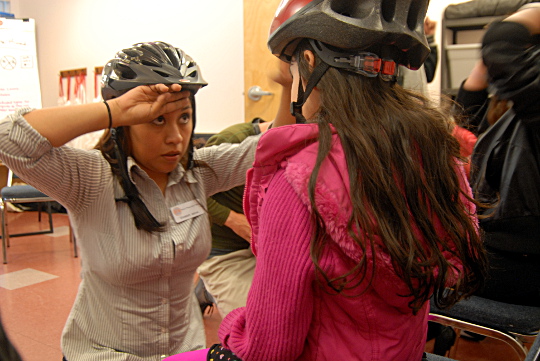
(Photo: M.Andersen and J.Maus/BikePortland)
For a moment this spring in the community room of the apartment building at SE 122nd and Halsey, the most important thing the Bicycle Transportation Alliance was doing was asking nine children a question.
“Make sure that you have no more than two fingers from the top of your helmet and your eyebrow here,” BTA advocate Elizabeth Quiroz told the room. “Can everybody try that?”
Everybody tried it.
For the fourth-largest local bike advocacy organization in the country, which holds its annual members’ meeting on Thursday, this is what the mission looks like circa 2014.
In one year, maybe two, Quiroz might ask one or two of these teens to turn out for a bike lane hearing. She might ask the director of the nonprofit hosting her bike-skills class to sign a petition to the city council or a grant application to the Robert Wood Johnson Foundation.
But none of those pieces are in play yet. When it comes to local advocacy, the BTA’s leaders say, they’re still setting up the board.
Learning to work with less
Like just about everyone connected to the world of Portland bicycling, the Bicycle Transportation Alliance has been learning to live without growth.
The BTA’s revenue tripled from 1998 to 2000, held steady until 2005, and then nearly tripled again from 2005 to 2010.
Then, just as bicycle transportation stopped getting more common in Portland, the recession hit both of the BTA’s biggest money sources: private donations and government grants. In 2008, the organization lost $92,000 on a $1.5 million budget. Over the next year, it dismissed eight employees, almost half of the staff, finishing with the firing of Executive Director Scott Bricker. In the three years that followed, the BTA’s revenue plummeted 29 percent to just over $1 million.
It was the biggest shakeup in the organization’s history. In early 2010 the BTA’s board hired Rob Sadowsky, the director of Chicago’s Active Transportation Alliance, to come to Portland and turn things around.
Reaching out
As BTA activities like the Alice Awards have evolved from an evening of beers at Kell’s (executive director Karen Frost signed the bar tab and called it a night) into a major fundraising gala, the organization’s strategy for spending money has changed, too.
Sadowsky said work like Quiroz’s is a necessary first step to bringing more community organizations — like ROSE CDC, the East Portland housing nonprofit that hosted her workshop — into alliances with bike advocates.
“We’re starting not from ‘Hey, why don’t you support our work?’ but ‘How do we work together?'” Sadowsky said in an interview.
Partnerships in low-income and marginalized communities — referred to in the bike advocacy world by the one-word shorthand “equity” — can be good for revenue, too. Many private foundations focus on improving the health of people in poverty, and may give grants to the BTA and its partners for increasing biking among the disadvantaged.
“I think the biggest opportunity for us, particularly in health, is to grow the equity work,” Sadowsky said. “And we can’t just go out and get money unless we have true partnerships.”
Two years ago, the state cut its compensation rate for Safe Routes to Schools workshops. Sadowsky responded by partnering with the Urban League of Portland, a historically African-American civil-rights organization, to recruit young, part-time employees to lead the BTA’s Safe Routes to Schools biking workshops in Portland elementary schools. Because of the lower wage, the recruits were “more entry-level” than their predecessors had been, Sadowsky said. But he thinks their race and background will help the BTA diversify.
“It’s going to build future leaders, future board members, future staff,” he said.
Advertisement
Back and forth on Barbur
In fall 2013, the BTA seemed to have a golden opportunity on Barbur Boulevard.
The four-lane road, the only flat link between Southwest Portland and the rest of the city, was due to be repaved.
For years, a group of Southwest Portland neighborhood activists had been pushing the state, city and regional governments to consider converting a northbound auto lane into a continuous bike lane in each direction. This would remove the need for bikes and cars to merge into the same 45 mph lane over two narrow bridges.
The proposal would barely affect the auto capacity of the road, Metro traffic engineer Anthony Buczek said, because the stoplights north and south of the bridges were the traffic chokepoints.
It seemed like a win-win — safer road, better biking, minimal effect on drivers — and the BTA was in full support. It emailed an “action alert” to its members to show their support, the only such request Portland members have received in the last year. And for about a week, it looked as if Portland’s city council might back the BTA up by negotiating with the state to get further study of bike lanes.
When the council reversed course, the BTA issued an “action alert” calling members to testify at City Hall. Four days later, Commissioner Steve Novick announced that he “would like” a road diet study within 12 months. At that, the BTA called off its volunteers and asked them to praise Novick’s decision to not twist the state’s arm.
Pressure from new friends
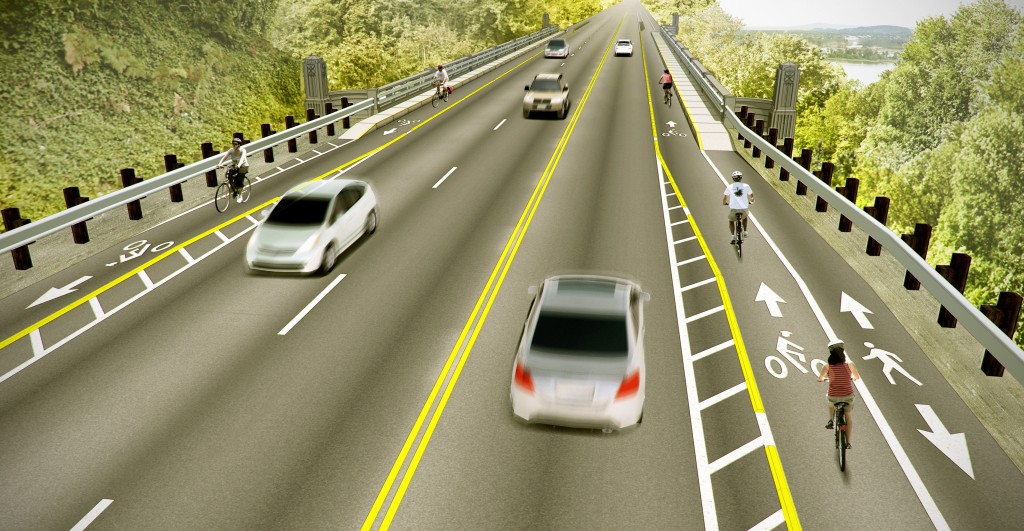
(Graphic by Owen Walz/OwenWalzDesign.com)
In an interview for this post, Sadowsky explained that the BTA softened its tone on Barbur after hearing from members of the Westside Economic Alliance, a business advocacy group that includes major Washington County employers and freight customers.
“We fought hard and we took a pretty hard stand on Barbur, and we received a lot of criticism for not doing more on Barbur,” Sadowsky recalled. “We also had an equal number of people who were like, ‘What the heck are you doing?’ [We] heard pretty loud and clear from our partners in Washington County, that we had been building relationships with on trails, that they didn’t like what was going on.”
Sadowsky said the fight over Barbur, even though it was about perceived congestion rather than actual congestion, left “consequences that we’re still trying to recover, including making it more difficult to partner with the Westside Economic Alliance.”
Sadowsky expects the BTA to continue its strategy of wooing non-bike-related organizations as it heads into next year’s legislative session, which many predict will be dominated by a fight over transportation funding.
“We’re not going to go out and attack AAA and Oregon Truckers,” Sadowsky said. “We want to go out and find a way to partner so that they see alignment and they’re not fighting us on the inside.”
In 2009, just before a prior fight over transportation funding, the BTA unsuccessfully pushed to let Oregonians treat stop signs as yield signs while they were on bikes. It went down in flames. Sadowsky said legislators left the BTA out in the cold after that.
“We’ve spent years trying to recover from that,” Sadowsky said.
‘Return to its roots, or step aside’
Not everyone is a fan of Sadowsky’s patient, cautious style. One critic is the BTA’s co-founder, Rex Burkholder.
In a comment on this site last week, the former Metro commissioner wrote:
As of 1990, there were some 3 miles of bike facilities in Portland (the 1-205 bike path built by ODOT). After attending 10 years of meetings and seeing nothing happen, I helped start the Bicycle Transportation Alliance. We did what any other grassroots, volunteer group does to move an agenda: we agitated, demonstrated, had postcard campaigns, and worked directly with elected officials, using the currency they understood — numbers.
It is both sad and discouraging to read this and other comment threads and the BTA is not ever mentioned. The wins we have in Portland came directly from the BTA creating a unified voice. Now, despite having great pro-bike policies, staff will not implement because they don’t have the backing of their bosses — the city council — and the city council won’t be bold without being pushed. …
It’s time for the BTA to return to its roots, or step aside.
Others are gentler, but seem similarly concerned. During an interview two weeks ago, mayoral policy staffer Jackie Dingfelder, an Alice Award winner whose husband served as an early BTA board member, expressed confusion about why the BTA rarely seems visible at City Hall.
‘Being successful in Portland may make it more difficult for us to be successful in Washington County’
In an interview Tuesday, Sadowsky said his team is at City Hall frequently but doesn’t see Dingfelder because she doesn’t focus on bike issues. It devotes a lot of time to partnerships, he said, because they get results — both in paying for the BTA’s work and in helping it pay off.
A week and a half ago, Sadowsky said, Washington County Chair Andy Duyck invited him to sit on the stakeholder committee for a new county vehicle registration fee that might dedicate 10 percent of its proceeds to biking and walking.
“I don’t think it is remotely possible that that would have been a call that Duyck made three years ago,” Sadowsky said. “That’s clout. … We’re attending meetings, we’re having members attend meetings, we’re vocal. And we’re making key differences.
“Being successful in Portland may make it more difficult for us to be successful in Washington County,” he added. An advocacy group that will always “stand up for Portland” at the expense of other cities would be “a different organization, and it’s not who we are.”
But Sadowsky said the BTA is looking for ways to influence “folks who know they want to support us, like Steve Novick or Charlie Hales, but feel they are hearing much louder from other folks.”
That’s exactly why the BTA is working to get organizations other than itself to speak out for biking, he said.
If two years ago the BTA had launched a “20s Bikeway campaign” that sent staff or volunteers “door to door with businesses” to build support for bike access, Sadowsky said, “we might have seen a different result” than the city’s decision to prioritize free parking — a decision Sadowsky called a “mess.”
Demonstrations of political anger might be satisfying in the moment, Sadowsky said, but they only alienate politicians.
“I could go scream at Steve Novick and I could go get 1,000 postcards or phone calls, but that’s not going to help me the next time with Steve Novick,” he said. “I’m not going to lock my neck to City Hall with a u-lock.”
Looking long-term
Sadowsky said he knows that change in Portland has been “slow,” and he wants to improve it.
“In the last three years, we’ve been building a very strong proactive plan,” he said. “Building a staff that can do that, building a board that can do that, building a funding that’s sustainable. … You’ll see this week, as we announce a campaign, how we’re going to do that work.”
If the campaign takes a while to pay off, maybe that’s for the best.
“I know that people look at what’s going on in Chicago and New York and say, ‘Why aren’t we doing things at that speed?'” he said. “It’s because we don’t do things at that speed.
“I know right now what I’m seeing in Chicago is the beginning of a severe backlash against bicycling,” said Sadowsky. “We need community buy-in. It’s just essential to moving forward. Or you take a little step forward, and then you take a big step back.”
The BTA’s annual members meeting is 5:30-7 pm Thursday in the Portland Art Museum. As always, we’ll be covering the rollout of their next Portland advocacy campaign.
Correction 2:50 pm: A previous version of this post incorrectly described a BTA action alert last year. It was a call to testify in mass but not a “rally.”

